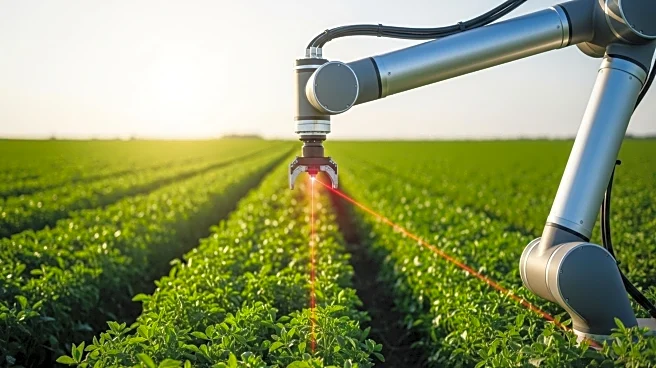What's Happening?
Carbon Robotics has introduced the LaserWeeder, a high-tech machine designed to eliminate weeds using laser beams, to the European market after its initial launch in the United States. The LaserWeeder uses high-resolution cameras and AI software to identify and target weeds, offering a chemical-free alternative to traditional weed control methods. The machine has been operational in the Netherlands, where it has shown promising results in various crops, including onions and carrots. The LaserWeeder is capable of removing up to 200,000 weeds per hour and is designed to operate autonomously, making it a significant innovation in smart farming technology.
Why It's Important?
The introduction of the LaserWeeder represents a significant advancement in sustainable agriculture, offering a solution to the increasing pressure to reduce chemical use in farming. By providing an effective alternative to chemical herbicides, the LaserWeeder could help farmers reduce their environmental impact while maintaining crop yields. This technology is particularly beneficial for organic farmers who seek to minimize chemical inputs. Additionally, the machine's ability to operate autonomously and reduce manual labor requirements could lead to cost savings and increased efficiency for farmers, potentially transforming weed management practices in the agricultural industry.
What's Next?
As the LaserWeeder gains traction in Europe, its adoption in the U.S. is likely to expand, especially among farmers looking for sustainable and efficient weed control solutions. The development of a second-generation model with improved laser technology and reduced maintenance needs is expected to enhance its appeal. The machine's high initial cost may be a barrier for some, but as more units become available and the technology proves its value, wider adoption is anticipated. The success of the LaserWeeder could encourage further innovation in agricultural robotics, leading to more advanced and cost-effective solutions in the future.
Beyond the Headlines
The LaserWeeder's impact extends beyond immediate agricultural benefits, as it aligns with broader environmental goals and regulatory pressures to reduce chemical use in farming. Its success could influence policy decisions and encourage investment in similar technologies. The machine also highlights the growing role of AI and robotics in agriculture, which could lead to significant shifts in labor dynamics and farm management practices. As the technology evolves, ethical considerations regarding data privacy and the displacement of traditional farming jobs may arise, necessitating careful management and policy development.










